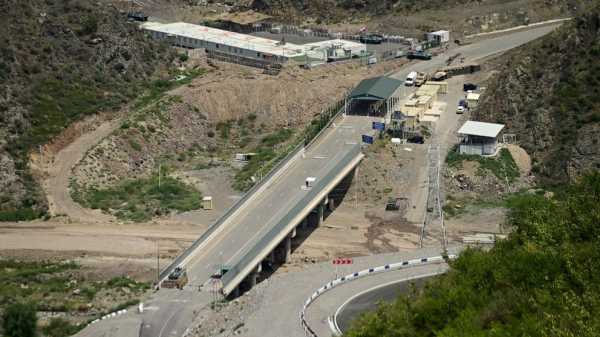
KORNIDZOR, Armenia — The former chief prosecutor of the International Criminal Court warned that Azerbaijan is preparing genocide against ethnic Armenians in its Nagorno-Karabakh region and called for the U.N. Security Council to bring the matter before the international tribunal.
A report by Luis Moreno Ocampo issued Tuesday said Azerbaijan's blockade of the only road leading from Armenia to Nagorno-Karabakh seriously impedes food, medical supplies and other essentials to the region of about 120,000 people.
“There is a reasonable basis to believe that a genocide is being committed,” Ocampo's report said, noting that a U.N. convention defines genocide as including "deliberately inflicting on the group conditions of life calculated to bring about its physical destruction.”
“There are no crematories and there are no machete attacks. Starvation is the invisible genocide weapon. Without immediate dramatic change, this group of Armenians will be destroyed in a few weeks,” the report said.
Nagorno-Karabakh is a region within Azerbaijan that came under the control of ethnic Armenian forces backed by the Armenian military in separatist fighting that ended in 1994. Armenian forces also took control of substantial territory around the region.
Azerbaijan regained control of the surrounding territory in a six-week war with Armenia in 2020. A Russia-brokered armistice that ended the war left the region's capital, Stepanakert, connected to Armenia only by a road known as the Lachin Corridor, along which Russian peacekeeping forces were supposed to ensure free movement.
A government representative in Azerbaijan dismissed the report from Ocampo, who was the ICC’s first prosecutor, saying it “contains unsubstantiated allegations and accusations.”
“It is biased and distorts the real situation on the ground and represents serious factual, legal and substantive errors,” Hikmet Hajiyev, an assistant to Azerbaijan President Ilham Aliyev, told The Associated Press, on Wednesday.
In December, crowds of demonstrators who claimed to be environmental activists blocked the Lachin Corrirdor. Azerbaijan later established a military checkpoint on the road, blocking traffic that it alleged was carrying weapons and other contraband.
In Kornidzor, near the Azerbaijan border, a line of 19 trucks loaded with some 360 tons of medicine and food supplies have been parked for two weeks waiting for permission to cross.
Vardan Sargsyan, a representative of a crisis management working group for Nagorno Karabakh set up by the Armenian government, told The Associated Press the Armenian government had asked for permission for the trucks to cross via Russian peacekeepers and provided details on their contents but so far received no response from Azerbaijan.
“Unfortunately, there have been many attempts from the Azerbaijani side to manipulate this situation,” he said. “We just hope that this humanitarian initiative will be accepted as humanitarian and that it will be possible to transfer the goods."
The International Committee of the Red Cross has also complained of being unable to bring aid shipments into the isolated enclave during the blockade, although the organization was permitted to evacuate a limited number of patients to Armenia for medical care.
Ocampo said the U.N. Security Council should refer the situation to the International Criminal Court, a step that would be necessary for the ICC to take it up because Azerbaijan is not a signatory to the statute that created the court.
It is not clear if Russia would use its veto power on the Security Council against such a move. Russia has faced persistent criticism for its peacekeepers' inaction in the blockade.
"Russia, responsible for peacekeeping in Nagorno-Karabakh, and the US, promoting current negotiations between Armenia and Azerbaijan, are state parties of the Genocide Convention. … They have a privileged position to prevent this genocide. Their intense confrontation due to the Ukrainian conflict should not transform the Armenians into collateral victims," Ocampo wrote.
___
Associated Press writers Jim Heintz in Tallinn, Estonia, and Aida Sultanova in London contributed to this report.
Sourse: abcnews.go.com






